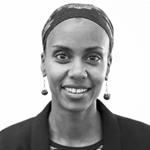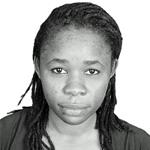![The many mothers of Sudan's revolution Sudanese demonstrators rally demanding electoral reforms, ahead of the 2010 national elections, in the capital Khartoum on December 7, 2009 [File: AP/Abd Raouf]](https://www.aljazeera.com/mritems/imagecache/mbdxxlarge/mritems/Images/2019/5/2/eec715af2b2d441bac4d537b9566105e_18.jpg)
On April 10, the photograph of 22-year-old engineering student Alaa Salah chanting in front of a crowd of protesters went viral, capturing the world's attention and breaking an international media blackout on Sudan's protests.
She was quickly branded the "symbol" of the Sudanese revolution, her image defying spurious normative ideas of Muslim women as oppressed and politically passive. The international media obsessed over her act of courage and exceptionalised it, missing a critical opportunity to look into the central role Sudanese women have played in the revolution so far and the broader historical context in which their activism has emerged.
In fact, the history of Sudan has been dotted by iconic female figures: from the Kandaka (the Nubian queen) of Meroe, whose military strategy prevented Alexander the Great from conquering Nubian lands in 332 BC, to Dr Khalida Zahir, Sudan's first woman doctor who was arrested by the British in 1946 for opposing colonial rule, to Fatima Ibrahim a prominent communist and leader of the Sudanese Women's Union, who fought for women's right to vote, equal pay and maternity leave.
It is important for us, two women from the Gezira and Darfur, to point out that while some of these feminist icons from central and northern Sudan have received recognition, the critical role working-class women and women from marginalised regions have played as drivers of popular resistance against dictatorship, political marginalisation and state violence in Sudan for decades has largely been overlooked.
In this sense, Alaa is the daughter of not just prominent Sudanese feminists but also of generations of ordinary women from across Sudan who have been at the forefront of anti-regime resistance. Their fight for dignity and freedom has laid firm foundations from which now she and countless other young women protesters can step in their courageous struggle against the regime.
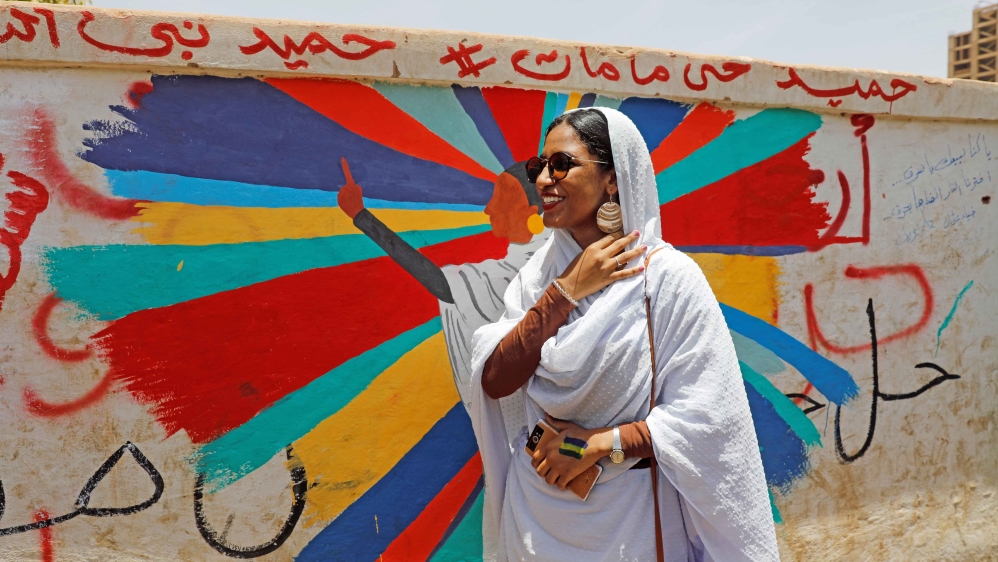 |
| Alaa Salah stands in front of a mural depicting her in Khartoum, on April 20, 2019 [Reuters/Umit Bektas] |
What Alaa said and the world didn't hear
Although much has been written about Alaa's image, the international media largely ignored the words she spoke that day: "They imprisoned us in the name of religion, burned us in the name of religion … killed us in the name of religion" she chanted, quoting a poem by Sudanese poet Azhari Mohamed Ali. "But Islam is innocent. Islam tells us to speak up and fight against tyrants … the bullet doesn't kill. What kills is the silence of the people."
Alaa's recitation was by no means an exceptional act. Her public performance echoes a long tradition of Sudanese women performing praise and lament poems to honour the dead, boost the morale of warriors and defy ruthless leaders.
Among Sudan's renowned female poets are Meheira bint Aboud from Nubia, who famously recited poems to Sudanese warriors fighting against the invading armies of Egyptian Khedive Mohammed Ali Pasha, and the anti-colonial icon Hawa al-Tagtaga from Kordofan, who was jailed by the British after performing nationalist songs at the Labour Theatre in Atbara, on the eve of Sudan's independence.
More importantly, with the poem she recited, Alaa, like many Sudanese women before her, was rebelling against the regime's pernicious practice of using religion in its repressive campaigns to silence dissent. In 1992, three years after Omar al-Bashir took power through a military coup, his government passed a series of "public order" laws under the guise of "implementing Islamic law" in many parts of the country.
These laws allowed its security apparatus to criminalise women wearing trousers, leaving their hair uncovered, singing "immoral" songs at weddings and concerts and going out with male friends. They were often used by security officers to harass and arrest women journalists, musicians and dissidents, who criticised the regime.
In 2009, for example, journalist Lubna al-Hussein, an outspoken critic of the regime, was sentenced to 40 lashes for wearing trousers in public, but fought her charges in court. The same year, 16-year-old Silva Kashif, a young Christian woman from South Sudan living in Khartoum, was lashed 50 times for wearing a skirt that fell below her knees, after being denied the right to trial.
These public order laws were also used to systematically target and undermine the livelihoods of working-class women. In 2017, for example, the regime banned 380 women tea vendors from working on Nile Street in downtown Khartoum. The women, led by the Association of Food and Beverage Vendors, fought back by organising a vigil to demand the ban be reversed.
Today, this same association is at the forefront of anti-regime protests in Khartoum.
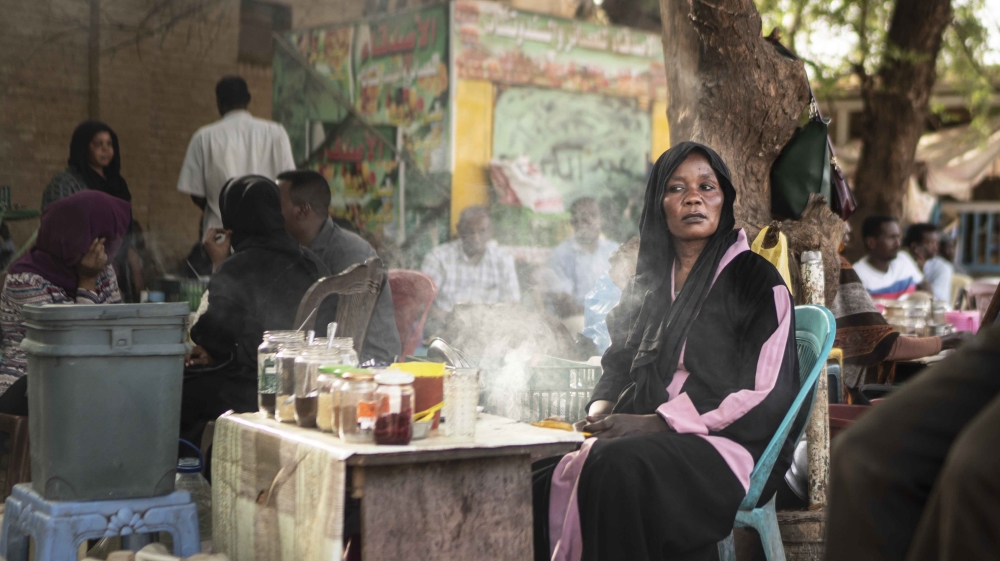 |
| A woman sells tea in a cafe area close to the main gathering point for the demonstrations against the military junta in Khartoum, Sudan on April 27, 2019 [Fredrik Lerneryd/Getty Images] |
Women of the periphery resisting
Religion and Arabised identity have long been instrumentalised by the ruling Sudanese elite in order to suppress dissent among various groups in Sudan's peripheral areas.
As Roselyn Onyeka, a South Sudanese activist, pointed out in a conversation with us, Sudan's "periphery" has resisted the assimilationist campaigns of successive northern regimes, and their policy of concentrating resources in the capital and surrounding areas, leaving other regions impoverished and underdeveloped.
In the 1980s, women and men in the south led non-violent protests against the regime of Sudanese dictator Gaafar Nimeiry, his attempt to impose Islamic law on a multi-religious nation and his campaign of detention, torture and killings of civilian dissidents.
Onyeka said she still vividly remembers the day she participated in a protest against the imposition of Arabic and Islamic Studies as a prerequisite to obtaining a high school certificate in the mid-1980s. She was a secondary school student at the time and recalls leading an all-girls' march in front of her school to demand an end to this discriminatory policy.
"We watched as a military tank approached, pointing its gun towards us. Had it not been for a northern soldier who refused his commander's orders and stepped out of the tank to point the gun into the air, we would have all been killed that day," she said.
Onyeka asserts that women in her native Eastern Equatoria have always played an important role in preventing inter-communal violence and brokering peace between communities.
Similarly, in Darfur, hakamat or women poets have historically played significant social and political roles as oral historians and in encouraging or discouraging war. In recent years, they have engaged in peace-building efforts and have openly criticised members of the regime.
Women also joined the armed struggle as both fighters and strategists in South Sudan, the Nuba Mountains and elsewhere. Katibat banat, for instance, an all-women battalion, which formed part of the Southern People's Liberation Movement (SPLM), played a significant yet undervalued role during Sudan's second civil war.
 |
| A southern Sudanese woman and her child prepare an evening meal on September 30, 2003, while armed with a Kalashnikov in a homestead in Rumbek, South Sudan [Reuters] |
It is important to note, however, that armed resistance movements in these regions, largely emerged after non-violent resistance against political exclusion, underdevelopment and fabricated food shortages, was violently suppressed by post-colonial regimes.
This history of non-violent resistance, led by women (and men) in South Sudan, Darfur, the Nuba Mountains and Eastern Sudan, has purposefully been erased and written out of Sudan's history books and public memory.
It is this deliberate exclusion that has led many to mistakenly view Sudan's revolutions (of 1964, 1985 and now 2019) as disconnected from popular resistance movements in marginalised areas of the country - this despite the fact that the protests in December first started in the periphery.
When the centre and periphery come together
As women took to the streets in Khartoum and other cities in the country's centre to protest alongside men, they faced the full brutality of al-Bashir's security apparatus. Women protesters were arrested, tortured and killed by security forces alongside their male counterparts. A significant number of those arrested were sexually assaulted by their jailers.
While such brutal tactics had been used against protesters and dissidents in Khartoum in the past, communities in the south and west of the country have faced them on a much larger scale. For decades, under the cover of a state of emergency, the regime has perpetrated indiscriminate attacks on civilians and brutally suppressed civil society and youth-led civic resistance.
As protests gained momentum, women in rural areas took the opportunity to speak up about these atrocities in their own communities outside the capital.
In a video widely circulated on Sudanese social media shortly after al-Bashir's removal, an unnamed woman protesting in Kordofan can be seen chanting: "From Kordofan [the revolution] has emerged, after we have been hit by gunfire. This is a government with no feelings … and the Nuba mountains, like Darfur their blood is very expensive. We will protect our land, oh farmer. Our Sudan will be set free!"
Some women from rural, peripheral areas have travelled to Khartoum to support the protests, and to ensure that their demands for political inclusion and justice are met. At the sit-in in front of the military headquarters, a woman protester from Darfur who wished to remain anonymous, told us that the cycle of death and pain women, and particularly mothers, in central Sudan have suffered over the last four months, is all too familiar to her.
People in her displaced community in South Darfur have faced death and violence at the hands of government militias since 2003; sexual assault has been used systematically against women as part of this brutal onslaught. She insisted that those responsible for these war crimes must be brought to justice.
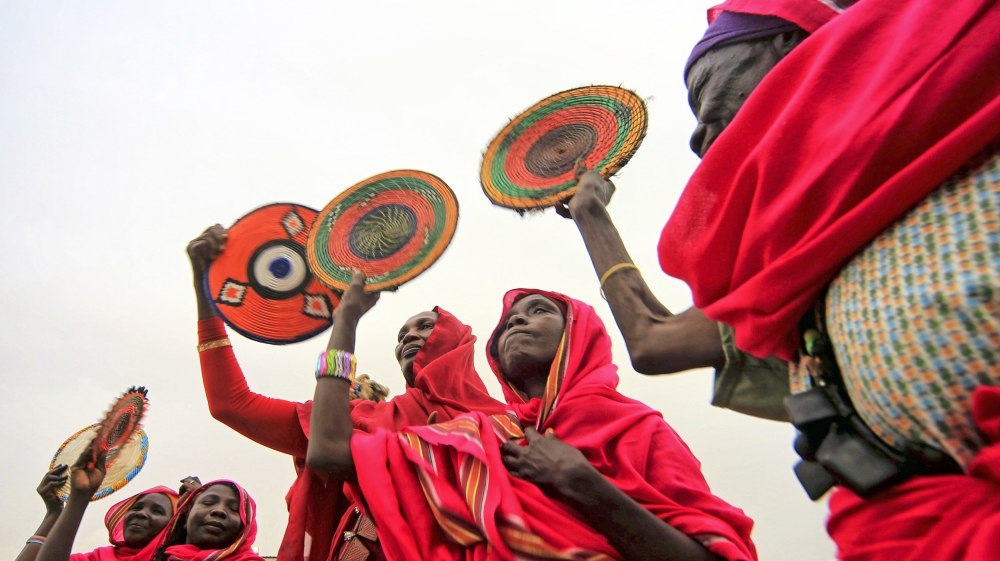 |
| Darfuri women participate in a peace rally on International Peace Day at the town of al-Fashir in North Darfur on September 23, 2013 [Reuters/Mohamed Nureldin Abdallah] |
Youth from the periphery have also now taken it upon themselves to educate revolutionaries in Khartoum about their struggles and about the importance of viewing them as integral to the larger project of building a new Sudan.
Last week, a group of young Darfuri women and men, for example, decided to launch a campaign to raise awareness about the atrocities the regime had committed in places like Darfur, the Nuba Mountains, Blue Nile state, Eastern Sudan, South Sudan and in the far north where government-built dams have displaced tens of thousands.
They prepared an improvised exhibition of images that document these atrocities inside a makeshift tent at the centre of the sit-in. In a conversation with us, the young women organisers expressed hope to launch a series of political education workshops and lectures, and help more people acknowledge the devastating consequences of collective denial.
Building the new Sudan we want
Centring the voices of women who have fought and suffered the oppression of the regime for decades is crucial, especially at a moment when the international media is primarily focused on the ongoing sit-in in Khartoum.
This myopic focus on the capital has disregarded ongoing protests in places like Zalingei and Nyala in Darfur, Port Sudan and Gedaref in the east, Atbara in the north, Wad Medani in Gezira and Singa in Sennar state.
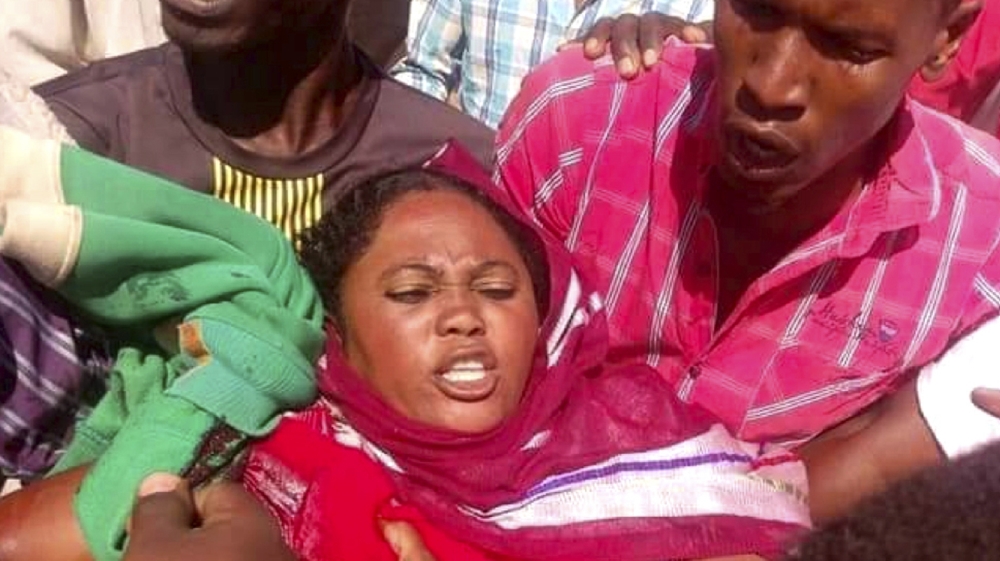 |
| Demonstrators help a woman who was shot in her hand during clashes with security forces, in Umm Ruwaba, north Kordofan, Sudan on December 23, 2018 [Sudanese Activist via AP] |
While the military in Khartoum began protecting protesters from the gunfire of snipers deployed by the interior ministry, outside the capital they did not intervene to stop such violence. The day al-Bashir was ousted, security forces killed some 13 civilians outside the capital.
We should not forget that the army constitutes an integral part of the former regime and that a continuous presence of al-Bashir's inner circle in politics will allow the regime to reproduce itself and survive.
Only when the former regime is fully dismantled, can the task of building a new Sudan led by a civilian transitional government begin. This process, however, has to involve women, who have borne the brunt of our extractive war economy and political repression.
With this idea in mind, on April 14 a coalition of women's groups who have been mobilising people and leading protests throughout this uprising issued a statement in support of the Declaration of Freedom and Change, demanding that at least 50 percent of those who make up every facet of the new transitional government are women and that affirmative action be implemented in favour of representatives from marginalised regions.
The fact that the protesters - both women and men - have made it clear that they reject the new leadership of the military council is an encouraging sign. The council's head, General Abdel Fattah al-Burhan, and his deputy, Mohamed Hamdan Dagalo (also known as Hemeti) are both responsible for countless war crimes and crimes against humanity committed by forces under their command in Darfur and in South Sudan. Whatever attempts are made abroad to whitewash their track record will likely fail to take any effect at home.
Meanwhile, there has also been a push for much introspection within the protest movement about societal oppression. Women at the sit-in have organised marches to demand that men actively challenge the culture of sexual harassment that has left women feeling unsafe within protest spaces. Calls by the Sudanese Professionals Association on women protesters to lead cleaning activities have also been sharply rejected and criticised.
In many ways the sit-in is increasingly becoming a microcosm of the kind of society that young people are yearning to build, one in which the social change they seek becomes a political reality.
The young women we spoke to all told us that there is plenty of reason for hope, but that this revolution, which has been decades in the making, has only just begun.
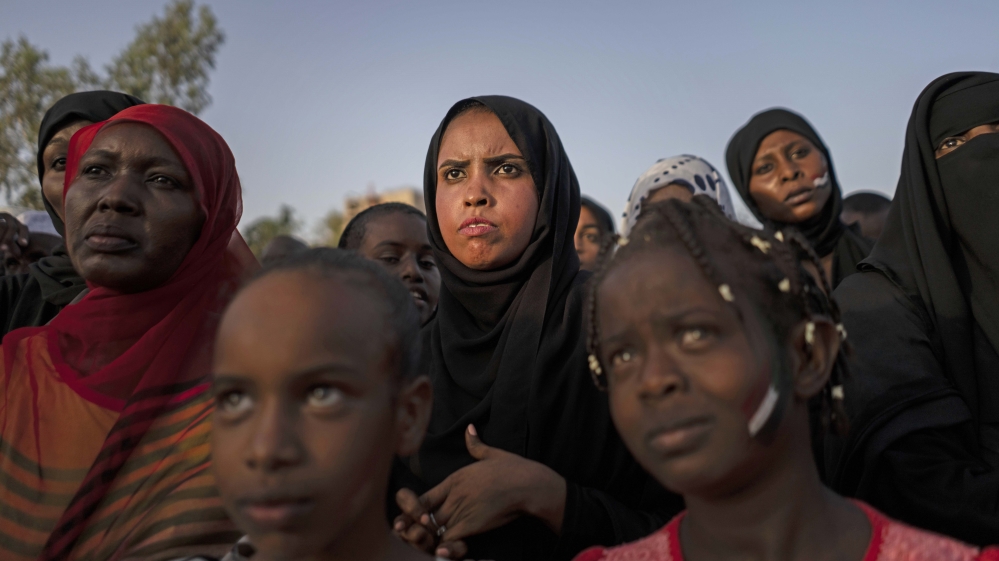 |
| A group of Sudanese women taking part in a protest against the military junta on April 26, 2019 in Khartoum, Sudan [Getty/Fredrik Lerneryd] |
The views expressed in this article are the authors' own and do not necessarily reflect Al Jazeera's editorial stance.

